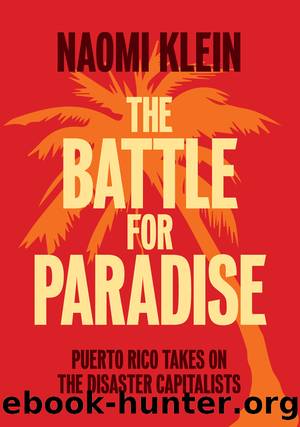The Battle for Paradise by Naomi Klein

Author:Naomi Klein
Language: eng
Format: epub
Publisher: Haymarket Books
Published: 2018-05-07T00:00:00+00:00
SHOCK-AFTER-SHOCK-AFTER-SHOCK DOCTRINE
The day before I walked through that portal in Orocovis, Gov. Ricardo Rosselló delivered a televised address from behind his desk, flanked by the flags of the United States and Puerto Rico. âWhile overcoming adversity, we also find great opportunities to build a new Puerto Rico,â he announced. The first step was to be the immediate privatization of the Puerto Rico Electric Power Authority, known as PREPA, one of the largest public power providers in the United States and, despite its billions of dollars in debt, the one that brings in the most revenue.
âWe will sell PREPAâs assets to the companies that will transform the power generation system into a modern, efficient, and less costly system for our people,â Rosselló said.
It turned out to be the first shot in a machine-gun loaded with such announcements. Two days later, the slick, TV-friendly young governor unveiled his long-awaited âfiscal plan,â which included closing more than 300 schools and shutting down more than two-thirds of the island governmentâs executive-branch entities, going from a total of 115 to just 35. As Kate Aronoff reported for The Intercept, this âamounts to a deconstruction of the islandâs administrative stateâ (so itâs no surprise that Rosselló has many admirers in Trumpâs Washington).
A week after that, the governor went on television again and unveiled a plan to crack open the education system to privately run charter schools and private school vouchersâmoves Puerto Ricoâs teachers and parents have successfully resisted several times before.
This deliberate exploitation of states of emergency to push through a radical pro-corporate agenda is a phenomenon I have called the âshock doctrine.â And it is playing out in Puerto Rico in the most naked form seen since New Orleansâs public school system and much of its low-income housing were dismantled in the immediate aftermath of Hurricane Katrina, while the city was still largely empty of its residents. And Puerto Ricoâs education secretary, the former management consultant Julia Keleher, makes no secret of where she is drawing inspiration from. One month after Maria, she tweeted that New Orleans should be a âpoint of reference,â and âwe should not underestimate the damage or the opportunity to create new, better schools.â
Central to a shock doctrine strategy is speedâpushing a flurry of radical changes through so quickly itâs virtually impossible to keep up. So, for instance, while most of the meager media attention has focused on Rossellóâs privatization plans, an equally significant attack on regulations and independent oversightâlaid out in his fiscal planâhas gone largely under the radar.
And the process is far from complete. There is a great deal of talk about more privatizations to come: highways, bridges, ports, ferries, water systems, national parks, and other conservation areas. Manuel Laboy, Puerto Ricoâs secretary of economic development and commerce, told The Intercept that electricity is just the beginning. âWe do expect that similar things will happen in other infrastructure sectors. It could be full privatization; it could be a true P3 [public-private partnerships] model.â
Despite the radical nature of these plans, the response from Puerto Rican society has been somewhat muted.
Download
This site does not store any files on its server. We only index and link to content provided by other sites. Please contact the content providers to delete copyright contents if any and email us, we'll remove relevant links or contents immediately.
| Arms Control | Diplomacy |
| Security | Trades & Tariffs |
| Treaties | African |
| Asian | Australian & Oceanian |
| Canadian | Caribbean & Latin American |
| European | Middle Eastern |
| Russian & Former Soviet Union |
The Secret History by Donna Tartt(16681)
The Social Justice Warrior Handbook by Lisa De Pasquale(11496)
Thirteen Reasons Why by Jay Asher(7810)
This Is How You Lose Her by Junot Diaz(5805)
Weapons of Math Destruction by Cathy O'Neil(5058)
Zero to One by Peter Thiel(4841)
The Myth of the Strong Leader by Archie Brown(4797)
Promise Me, Dad by Joe Biden(4462)
Beartown by Fredrik Backman(4447)
How Democracies Die by Steven Levitsky & Daniel Ziblatt(4430)
Stone's Rules by Roger Stone(4427)
The Fire Next Time by James Baldwin(4357)
100 Deadly Skills by Clint Emerson(4095)
A Higher Loyalty: Truth, Lies, and Leadership by James Comey(4045)
Rise and Kill First by Ronen Bergman(4029)
The David Icke Guide to the Global Conspiracy (and how to end it) by David Icke(3900)
The Farm by Tom Rob Smith(3884)
Secrecy World by Jake Bernstein(3793)
The Doomsday Machine by Daniel Ellsberg(3743)
